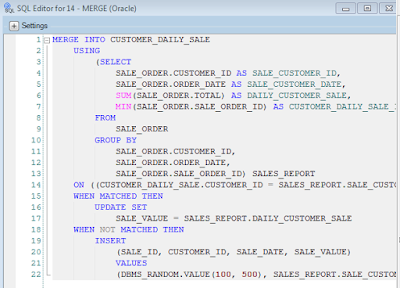A Better way to write Complex SQL queries for Programmers
There is no doubt that writing code is more art than science, every coder cannot write beautiful code which is both readable and maintainable, even with experience. In general, coding improves with experience when you learn the art of coding e.g. favoringcomposition over inheritance or coding forinterface than implementation, but only a few developers able to master these techniques. Same applies to SQL queries. The way you structure your query, the way you write it goes a long way to communicate your intent to the fellow developer. When I see SQL queries on emails from multiple developers, I can see the stark difference in their writing style.
Some developers write it so neatly and indent their query properly, which makes it easy to spot the key details e.g. which columns you are extracting from which table and what are conditions.
Since in real-life projects, SQL queries are hardly one-liner, learning the right way to write SQL query makes a lot of difference when you read it yourself later or you share that query to someone for review or execution.
In this article, I am going to show you a couple of styles which I have tried in the past, their pros and cons and what I think is the best way to write SQL query. Unless you have a good reason not to use my style e.g. you have a better style or you want to stick with the style used in your project (consistency overrules everything) there is no reason not to use it.
Btw, I expect that you are familiar with SQL and know different clauses and their meaning in a SQL query. If you are not, it's better you gain some experience with SQL by joining a good course like:
- The Complete SQL Bootcamp by Josh Portilla, a Data Scientist, on Udemy or
- SQL for Newbs: Data Analysis for Beginnersby David Kim and Peter Sefton's course on Udemy.
The 1st way to write SQL query
SELECT e.emp_id, e.emp_name, d.dept_name, p.project_name from Employee e INNER JOIN Department d ON e.dept_id = d.dept_id INNER JOIN Projects p ON e.project_id = p.project_id Where d.dept_name="finance" and e.emp_name like '%A%' and e.salary > 5000;
Pros:
1) The mixed-case was introduced to separate keyword from column and table names e.g. writing SELECT in a capital case and writing Employee in as it is, but given you are not consistent e.g. SELECT is in caps but from is in small, there is no benefit of using that style.
Cons:
1) Mixed case
2) The whole query is written on one line which gets unreadable as soon the number of tables and columns increases
3) No flexibility in adding a new condition or running without an existing condition
The 2nd way to write SQL query
SELECT e.emp_id, e.emp_name, d.dept_name, p.project_name from Employee e INNER JOIN Department d ON e.dept_id = d.dept_id INNER JOIN Projects p ON e.project_id = p.project_id Where d.dept_name="finance" and e.emp_name like '%A%' and e.salary > 500;
Improvement:
1) query is divided into multiple lines which make it more readable
Problems
1) Mixed case
2) All conditions on where clause is on the same line, which means excluding them by commenting is not that easy.
The 3rd way to write SQL query
select e.emp_id, e.emp_name, d.dept_name from Employee e inner join Department d on e.dept_id = d.dept_id where d.dept_name = 'finance' and e.emp_name like '%A%' and e.salary > 500;
1) Dividing SQL queries into multiple lines makes it more readable
2) Using proper indentation makes it easy to spot the source of data i.e. tables and joins
3) Having conditions on separate lines allow you to run the query by commenting on one of the conditions e.g.
select e.emp_id, e.emp_name, d.dept_name from Employee e inner join Department d on e.dept_id = d.dept_id where d.dept_name = 'finance' -- and e.emp_name like '%A%'; add e.salary > 5000
Btw, if you are a fan of Capital case for keywords, you can also write the same SQL query as shown below, the rules are same but just capital letters for keywords.

That's all about how to write SQL query which is readable and more maintainable. Feel free to give your opinion on what do you think of this indentation or styling of SQL queries. It's a simpler technique but very powerful and goes a long way on improving the readability of your complex SQL queries. If you like you can also use various SQL formatters online but I suggest you learn a style and stick with it, rather relying on formatters.
Further Learning
Introduction to SQL
The Complete SQL Bootcamp
SQL for Newbs: Data Analysis for Beginners
Other SQL and Database Articles you may like
- 5 Websites to learn SQL for FREE (websites)
- 5 Free Courses to Learn MySQL database (courses)
- 5 Free Courses to learn Database and SQL (courses)
- 5 Books to Learn SQL Better (books)
- How to join more than two tables in a single query (article)
- Difference between WHERE and HAVING clause (answer)
- 10 SQL queries from Interviews (queries)
- Top 5 SQL books for Advanced Programmers (books)
- Difference between SQL, T-SQL, and PL/SQL? (answer)
- Top 5 Online Courses to Learn SQL and Database (courses)
Thanks for reading this article and let me know how do you write SQL queries? which style you use, or you have your own style?
P. S. - If you are looking for a free course to start learning SQL and Database basics then I suggest you go through Introduction to Databases and SQL Querying course on Udemy. It's completely free, all you have to create a Udemy account and you can access whole course.

Join the conversation